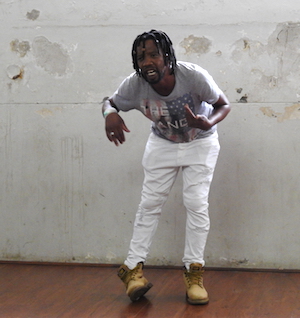 Moving slowly, Lwasi Mayeki shifts his body to hunch over and dangles one arm uselessly. He fixes us with a squinting eye, then starts a soliloquy from Richard III.
Moving slowly, Lwasi Mayeki shifts his body to hunch over and dangles one arm uselessly. He fixes us with a squinting eye, then starts a soliloquy from Richard III.
When he reaches the line that “dogs bark at me as I halt by them” you know that Mayeki knows how it feels to have dogs bark at him, too. This is Shakespeare for the homeless, playing out in a shabby building in Kapteijn Street grandly marked Hillbrow Theatre. It no longer looks like a theatre, with flats above and hawkers outside, but magic is happening in the basement.
A group of men are rehearsing to perform at St James Preparatory School and for a paying audience at Piza e Vino Restaurant. In the collective recitation of a poem their strong voices beat out the rhythm in unison. Then they individually recite a poem or a piece they have penned themselves, powerful and emotive as they capture destitute lives on the city streets.
Their group, Johannesburg Awakening Minds (JAM) was formed in 2012 by actress Dorothy Ann Gould, starting with seven men recruited at a soup kitchen. Some had been on the streets since they were children, running away from abusive parents or simply being abandoned.
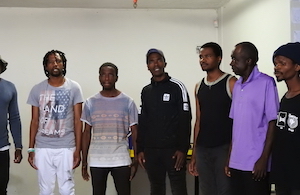 “I really got sad driving on Empire Road and seeing people begging and people winding up their windows and looking ahead as if there was nobody there. I wanted to build the confidence of as many people as I could and let them know that they have the right to speak,” Gould says.
“I really got sad driving on Empire Road and seeing people begging and people winding up their windows and looking ahead as if there was nobody there. I wanted to build the confidence of as many people as I could and let them know that they have the right to speak,” Gould says.
Gradually the weekly classes gave them self-respect, dignity and ambition. But when you have never had a voice, it takes time and courage to find it. “When some of them started they wouldn’t even say their names,” says Gould. “It’s taken years for some to get their voices out because nobody has been interested in their opinions. It’s all about healing. When your spoken voice is put out into the world then the power and images of the words start to flow through, and that to some measure heals your pain.”
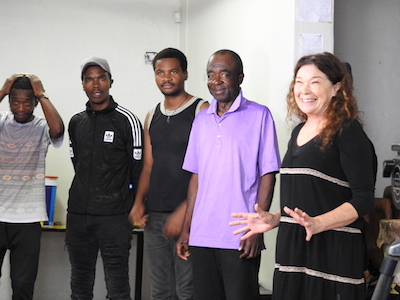 Shakespeare is a tough place to start, but Gould did it for the shock tactic. “If you can recite Hamlet’s soliloquy at the traffic lights you will probably get some money because people don’t expect that, so it’s breaking assumptions. People assume everybody begging is a glue sniffer.” They challenge my assumptions too, with their eloquence, enthusiasm and skills.
Shakespeare is a tough place to start, but Gould did it for the shock tactic. “If you can recite Hamlet’s soliloquy at the traffic lights you will probably get some money because people don’t expect that, so it’s breaking assumptions. People assume everybody begging is a glue sniffer.” They challenge my assumptions too, with their eloquence, enthusiasm and skills.
The men find that Shakespeare’s words relate directly to them and reflect their own circumstances, says Mayeki. He was one of the original crew and joined from curiosity. He was a homeless drug user, and credits JAM with turning him around. “I found a place where I can talk and my voice can be heard. It gave me something to believe in. Now I’m an actor and before I was just another kid on the street,” he says.
“The stories Shakespeare tells are still relevant today because it isn’t just about events, it’s about people and the human condition. It talks about love and tragedy and things that are happening in our lives. Some characters have lost everything so we can connect to what he writes about. We are the perfect people to tell his stories because we have been through a lot,” Mayeki says.
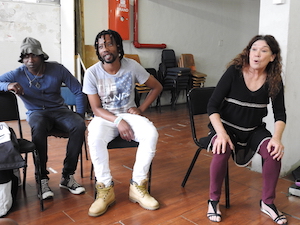 The group has grown to 23, and their determination under Gould’s guidance has helped many improve their circumstances. The lessons are free, and when they perform in public they keep the earnings. Most now have roofs over their heads, and one sponsor pays for three of them to share a room in Hillbrow.
The group has grown to 23, and their determination under Gould’s guidance has helped many improve their circumstances. The lessons are free, and when they perform in public they keep the earnings. Most now have roofs over their heads, and one sponsor pays for three of them to share a room in Hillbrow.
Acting agent Michelle Aldana works with them for free, setting up auditions and driving them there. Five had roles in the short film Krokodil, one was in Vaya by Akin Omotoso, and five have appeared in Generations.
When Bongani Dlamini (29) performs a poem, Gould gives him directional pointers, suggesting he puts more emphasis on the word thunder, and speaks more softly when he mentions ghosts. Roll your breath right to the last word of each line, she tells him.
“This is my home,” Dlamini says afterwards. “It’s where I found life after coming through rehab. My skill is going up and I’m learning more things because of what I’m doing here.”
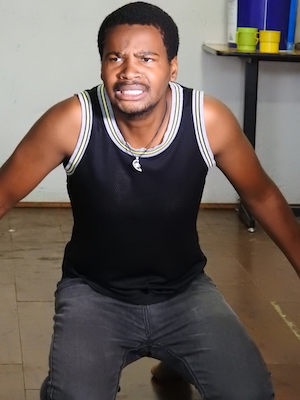 With a suitable touch of drama, Dlamini says Shakespeare kept him alive. “If it wasn’t for Shakespeare I wouldn’t have even gone to rehab. I was giving up because I had nothing to do and no money. I was using being an orphan as an excuse and having a lot of resentment that if it wasn’t for the way I was brought up I wouldn’t be suffering like this. I always had excuses.”
With a suitable touch of drama, Dlamini says Shakespeare kept him alive. “If it wasn’t for Shakespeare I wouldn’t have even gone to rehab. I was giving up because I had nothing to do and no money. I was using being an orphan as an excuse and having a lot of resentment that if it wasn’t for the way I was brought up I wouldn’t be suffering like this. I always had excuses.”
He would either be dead or in jail by now, but Shakespeare’s characters give him hope and strength because the tribulations he is experiencing are nothing new, he says.
JAM has seen setbacks and sadness too, with one member going back to drugs after appearing in commercials and another relapsing after earning a place in drama school. “People have been in and out of rehab but I believe in giving people a second, third and fourth chance,” Gould says. Four have died - two murdered, one from a drug-related heart attack, and one from pneumonia. One of them was Charles, who died after writing a beautiful piece saying ‘now I can hold my head up high’.
This week’s session ends with Louis Kalombo performing an extract from his play called Why? “Why are you looking at me like I’m not a human being like you? Am I a monster? When I walk in the street people close their nostrils when they see me coming. They tell me I am stinking. I’m stinking...”
The other actors applaud and murmur their agreement.
* For more info see @johannesburgawakeningminds on Facebook